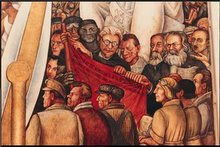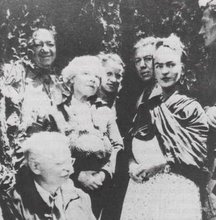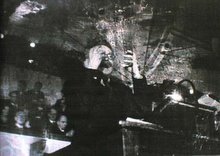WHAT DID THE ATTEMPTED ASSANIATION OF HITLER IN 1944 REPRESENT?
Fascism in Germany in power from 1933 to 1943 represented the power of Conservative Bourgeois elements and Aristocrats. Liberal Bourgeois elements decided to go behind Hitler as Chancellor in 1933 because if they put up serious resistance risked civil war which could lead to a Socialist Revolution.
Those Bourgeois elements realised the nature of Stalinism with KPD leaders but feared centrifugal forces among organised workers could lead to more genuinely revolutionary force gaining a base, particularly among the SPD’s base. This is why Trotsky proposed a united front with Social Democracy to win millions of Workers towards Revolutionary Marxism, which would begin to win decisive layers of Petty-Bourgeois elements towards a workers seizure of power. If that policy had been carried out Fascism would have been smashed.
Trotsky and Daniel Guerin in their classical Marxist works on Fascism pointed out despite them closing ranks against any resurgence of organisation among workers there will schism behind Liberal and Conservative (alongside Aristocratic) wings of Germany’s ruling class. An example of this was when Trotsky citing Marx where he attacked the Lasalleians for not distinguishing between Liberal Bourgeois and Aristocratic forces in the 1840s and 1850s.
That conflict deepened among German rulers in the 1930s over inflation caused by rearmament. This battle came to a head over whether they should risk a world war in the late 1930s or wait another two or three years to have sufficient economic and military resources e.g. oil. Liberal Bourgeois elements didn’t tolerate a war in September 1938 during the Munich crisis. There were orders by the German army to arrest Hitler if he went to war over Sudetenland.
The Nazis had to wage war because problems of inflation could have caused workers resurgence. This fear combined with uncertainty whether Britain or France would declare war over Poland led to German rulers closing ranks. After the fall of France these Liberal Bourgeois elements hero-worshipped Hitler. Trotsky explained in his writings how decaying classes turn to mysticism in order to delude themselves that their problems will be solved. When it came to invading the Soviet Union Hitler for once listened to the German army over the timing of that attack.
After initial German successes on Soviet territory during 1941 and 1942 Hitler grew stronger domestically. Once they were defeated at Stalingrad and the resulting Soviet counter-offensive Liberal Bourgeois and Aristocratic elements wanted Hitler and the Nazis out. Those Aristocratic elements in eastern Germany were motivated that Soviet advances threatened their power.
I have watching a programme on the History Channel this afternoon about plots to arrest and murder Hitler in 1943 and 1944. There were two major attempts at this before the major attempt in June 1944. In February 1943 there were plans to arrest him at the German eastern front HQ. During April of that year there was a planted bomb on his plane in Smolensk.
After their failure in 1944 those elements backed off fearing a civil war with the Nazis which could have led to German Capitalism being completely overthrown by those workers. They may have frightened by posters at Munich University during February 1943 calling for Hitler to be overthrown. There were two factors which were leading towards a pre-revolutionary crisis splits among ruling class layers and middle elements calling for the removal of Fascism. The only missing factors were a move by German workers and lack of revolutionary leadership. Revolutionary upheavals in France; Greece; and Greece must have compounded German ruling class fears.
Liberal Bourgeois elements probably vacillated between keeping contact with those middle class dissident forces to influence them and use them for their purposes, combined with suppressing any anti-Capitalist threat by working with their army and Fascist forces. Those middle class forces were mainly primarily influenced by the Church and slightly by army high command. Ernest Mandel argued in the 1980s that German workers didn’t rise up due to allied bombing. Capitalism was salvaged in Western Germany but the Aristocrats were overthrown in what became the East German degenerated Workers’ State. Despite the restoration of Capitalism in East Germany during 1990 the Aristocrats never had the same power in Germany.
Subscribe to:
Post Comments (Atom)



1 comment:
surely you understand that socialist revolution requires more than conflict within the ruling classes? all this talk about the possibilities of socialist revolution in germany during the time of the fascist dictatorship, combined with your omission of "workers" in the events of france, greece and italy in the 1940's just makes me wonder....
Post a Comment